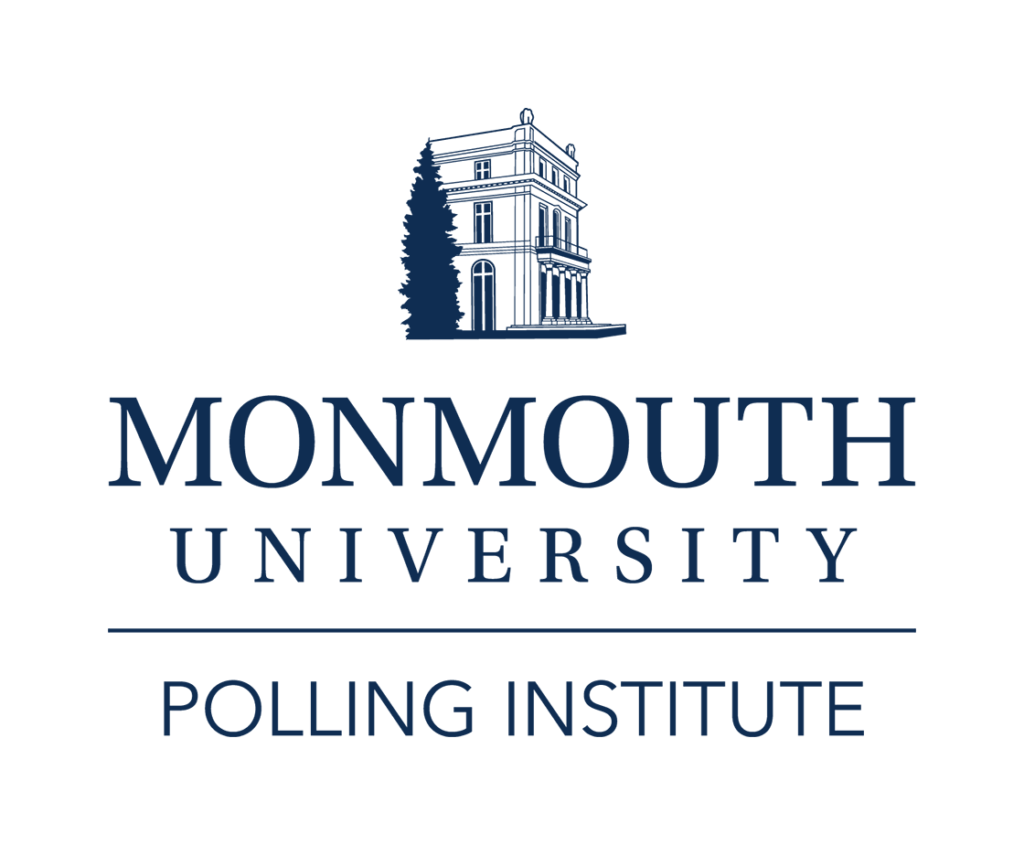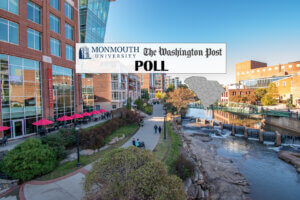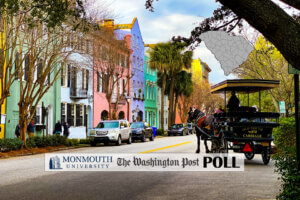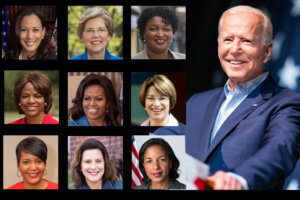Fresh off victories in Iowa and New Hampshire, Mitt Romney has a clear lead in South Carolina’s upcoming primary according to the Monmouth University Poll . The former Massachusetts governor registers 33% support among likely Republican voters in Saturday’s primary. Former House Speaker Newt Gingrich places second at 22%. Former Pennsylvania Senator Rick Santorum (14%) and Texas Congressman Ron Paul (12%) are in a close contest for third place. Rick Perry trails with 6%. Jon Huntsman earned 4% before he pulled out of the race on Monday.
Gingrich (30%) does best among those who call themselves very conservative, leading both Romney (25%) and Santorum (21%) among this voting bloc. But Romney does particularly well among voters who see themselves as somewhat conservative (39%) and moderate or liberal (38%). Gingrich also does well among those who say they strongly support the Tea Party movement – a group that represents more than one-third of the likely electorate – with 31%, to 29% for Romney. However, Romney bests Gingrich among those who support the movement only somewhat (39% to 17%) and either oppose or have no strong opinion about the Tea Party (31% to 15%).
Evangelical Christians, making up a majority of likely GOP voters in South Carolina, have been considered a weak group for Romney. He appears to be holding his own, though, earning 29% of this group’s vote to 26% for Gingrich and 19% for Santorum. Romney is the clear leader among non-evangelical voters at 37% to 17% for Gingrich and 9% for Santorum.
“Governor Romney appears to be consolidating his status as the one to beat. While he doesn’t enjoy an outright majority, he performs well with every major voting bloc possibly because the field is still crowded,” said Patrick Murray, director of the non-partisan Monmouth University Polling Institute in West Long Branch, New Jersey.
The poll asked likely South Carolina GOP primary voters which factor is more important in their decision – voting for someone who shares their values or someone who can defeat President Barack Obama. More voters choose values (51%) over electability (43%). Among these values voters, 23% support Romney, 19% Paul, 17% Santorum, and 15% Gingrich. Romney is the clear favorite, though, with voters more concerned about electability in November – earning 47% of this group’s vote to 28% for Gingrich, 12% for Santorum, and 6% for Paul.
Nearly all (89%) voters are aware that South Carolina Governor Nikki Haley has endorsed Mitt Romney, but it’s unlikely to sway anyone at this point. Most (71%) say her endorsement makes no difference to their vote. Of the remainder, more say it makes them less likely (21%) rather than more likely (8%) to support Romney. Among those intending to vote for Gingrich, Santorum and Paul, between 25% and 33% say Gov. Haley’s endorsement makes them less likely to support Romney and just 2% to 5% say it makes them more likely. Among Romney voters, 15% see the Haley endorsement as positive and 8% see it as negative, but the vast majority (76%) say it makes no difference in their choice.
South Carolina primary voters intend to stay loyal to the GOP even if their preferred candidate does not win the nomination. More than 7-in-10 (72%) say they will definitely vote for the Republican in November and another 12% say they will probably support the GOP nominee. Just 8% say they will vote for another candidate, 3% will not vote, and 4% are not sure what they will do. Between 75% and 83% of Romney, Gingrich, and Santorum supporters say they will definitely support whoever takes the Republican nomination. Just 53% of Ron Paul voters say the same.
The Monmouth University Poll was conducted by telephone with 963 likely South Carolina Republican primary voters from January 12 to 15, 2012. This sample has a margin of error of ± 3.2 percent.
DATA TABLES
The questions referred to in this release are as follows:
(* Some columns may not add to 100% due to rounding.)
1. If the Republican primary election for President were today, would you vote for Newt Gingrich, Jon Huntsman, Ron Paul, Rick Perry, Mitt Romney, Rick Santorum, or some other candidate? [If undecided: At this moment, do you lean toward any of the candidates I just named?] [NAMES WERE ROTATED]
|
TOTAL | PARTY ID | IDEOLOGY | GENDER | AGE | EVANGELICAL |
TEA PARTY | |||||||||
|
Rep | Ind/ Dem | Very Consv | Somewhat Consv | Mod/ Lib | Male | Female | 18-45 | 45-64 | 65+ | Yes | No | Support |
Neutral/ | ||
| Mitt Romney | 33% | 36% | 26% | 25% | 39% | 38% | 30% | 35% | 28% | 33% | 38% | 29% | 37% | 34% | 31% |
| Newt Gingrich | 22% | 23% | 18% | 30% | 19% | 8% | 24% | 19% | 20% | 21% | 25% | 26% | 17% | 24% | 15% |
| Rick Santorum | 14% | 14% | 16% | 21% | 12% | 6% | 12% | 17% | 13% | 16% | 13% | 19% | 9% | 17% | 8% |
| Ron Paul | 12% | 10% | 17% | 8% | 16% | 15% | 14% | 11% | 14% | 13% | 9% | 10% | 15% | 11% | 15% |
| Rick Perry | 6% | 6% | 6% | 9% | 3% | 5% | 6% | 6% | 6% | 6% | 6% | 7% | 5% | 6% | 6% |
| Jon Huntsman | 4% | 2% | 10% | 2% | 3% | 14% | 5% | 4% | 5% | 4% | 4% | 2% | 7% | 2% | 10% |
| Other | 2% | 1% | 3% | 2% | 1% | 4% | 1% | 3% | 3% | 2% | 1% | 3% | 1% | 1% | 4% |
| Undecided | 7% | 7% | 5% | 4% | 7% | 10% | 7% | 6% | 11% | 5% | 5% | 5% | 8% | 5% | 11% |
2. Which is more important in your primary vote decision – voting for someone who shares your values OR voting for someone who can defeat Barack Obama? [OPTIONS WERE ROTATED]
|
TOTAL | PARTY ID | IDEOLOGY | GENDER | AGE | EVANGELICAL |
TEA PARTY | |||||||||
|
Rep | Ind/ Dem | Very Consv | Somewhat Consv | Mod/ Lib | Male | Female | 18-45 | 45-64 | 65+ | Yes | No | Support |
Neutral/ | ||
| Shares your values | 51% | 47% | 59% | 49% | 47% | 63% | 49% | 52% | 57% | 51% | 43% | 51% | 51% | 46% | 61% |
| Can defeat Obama | 43% | 49% | 32% | 46% | 50% | 27% | 42% | 45% | 35% | 44% | 53% | 45% | 41% | 49% | 30% |
| No opinion | 6% | 4% | 9% | 6% | 4% | 10% | 8% | 3% | 8% | 5% | 4% | 4% | 8% | 5% | 9% |
3. If your preferred candidate does not win the Republican nomination, how likely will you be to support the eventual nominee in November? Will you definitely vote for the Republican, probably vote for the Republican, will vote for another candidate, or will not vote?
|
TOTAL | PARTY ID | IDEOLOGY | GENDER | AGE | EVANGELICAL |
TEA PARTY | |||||||||
|
Rep | Ind/ Dem | Very Consv | Somewhat Consv | Mod/ Lib | Male | Female | 18-45 | 45-64 | 65+ | Yes | No | Support |
Neutral/ | ||
| Definitely | 72% | 83% | 49% | 82% | 76% | 44% | 74% | 71% | 66% | 73% | 80% | 78% | 66% | 80% | 55% |
| Probably | 12% | 10% | 18% | 10% | 14% | 13% | 11% | 14% | 12% | 14% | 11% | 11% | 14% | 12% | 14% |
| Another candidate | 8% | 4% | 18% | 3% | 4% | 28% | 9% | 8% | 13% | 7% | 5% | 6% | 11% | 3% | 19% |
| Will not vote | 3% | 1% | 7% | 1% | 2% | 7% | 3% | 2% | 5% | 2% | 1% | 2% | 3% | 1% | 6% |
| Not sure | 4% | 2% | 8% | 3% | 4% | 7% | 4% | 5% | 5% | 4% | 3% | 2% | 6% | 4% | 5% |
4. Have you heard that Governor Nikki Haley has endorsed Mitt Romney?
| TOTAL | PARTY ID | IDEOLOGY | GENDER | AGE | EVANGELICAL | TEA PARTY | |||||||||
|
| Rep | Ind/
Dem | Very
Consv | Somewhat Consv | Mod/
Lib | Male | Female | 18-45 | 45-64 | 65+ | Yes | No | Support | Neutral/
Oppose | |
| Yes | 89% | 89% | 88% | 92% | 88% | 86% | 91% | 87% | 83% | 91% | 94% | 91% | 87% | 92% | 82% |
| No | 11% | 11% | 12% | 8% | 12% | 14% | 9% | 13% | 17% | 9% | 6% | 9% | 13% | 8% | 18% |
5. Does this make you more likely or less likely to vote for Romney, or does it make no difference?
|
TOTAL | PARTY ID | IDEOLOGY | GENDER | AGE | EVANGELICAL |
TEA PARTY | |||||||||
|
Rep | Ind/ Dem | Very Consv | Somewhat Consv | Mod/ Lib | Male | Female | 18-45 | 45-64 | 65+ | Yes | No | Support |
Neutral/ | ||
| More likely | 8% | 10% | 3% | 9% | 8% | 7% | 7% | 8% | 6% | 7% | 10% | 8% | 8% | 8% | 6% |
| Less likely | 21% | 19% | 27% | 20% | 18% | 29% | 21% | 21% | 21% | 21% | 22% | 21% | 21% | 16% | 33% |
| No difference | 71% | 71% | 70% | 72% | 74% | 64% | 72% | 70% | 73% | 72% | 69% | 71% | 71% | 76% | 61% |
6. What is your general opinion of the Tea Party movement –strongly support, somewhat support, somewhat oppose, strongly oppose, neutral or no opinion?
|
TOTAL | PARTY ID | IDEOLOGY | GENDER | AGE | EVANGELICAL |
TEA PARTY | |||||||||
|
Rep | Ind/ Dem | Very Consv | Somewhat Consv | Mod/ Lib | Male | Female | 18-45 | 45-64 | 65+ | Yes | No | Support |
Neutral/ | ||
| Strongly support | 37% | 40% | 30% | 60% | 25% | 10% | 41% | 32% | 31% | 38% | 41% | 46% | 26% | 53% | 0% |
| Somewhat support | 32% | 35% | 26% | 27% | 42% | 24% | 31% | 34% | 34% | 32% | 30% | 29% | 36% | 47% | 0% |
| Somewhat oppose | 8% | 7% | 12% | 1% | 10% | 20% | 7% | 10% | 11% | 8% | 5% | 5% | 12% | 0% | 27% |
| Strongly oppose | 7% | 3% | 15% | 2% | 2% | 25% | 8% | 5% | 8% | 7% | 4% | 4% | 10% | 0% | 22% |
| Neutral/no opinion | 16% | 15% | 17% | 9% | 20% | 21% | 12% | 20% | 15% | 14% | 19% | 16% | 16% | 0% | 51% |
The Monmouth University Poll was conducted by the Monmouth University Polling Institute in West Long Branch, New Jersey. The poll was conducted January 12-15, 2012 with a random sample of 963 likely Republican primary voters in South Carolina. The sample includes 837 voters who completed the survey via automated voice interviewing and 126 with a live interviewer, including 73 via cell phone. Telephone interviewing services were provided by Survey USA in Clifton, New Jersey. The sample was drawn from registered voter lists obtained from Aristotle, Inc., screened for those who say they are either “certain” or “likely” to vote in the Republican primary and weighted according to past voting history demographics.
For results based on the total sample, one can say with 95% confidence that the error attributable to sampling has a maximum margin of plus or minus 3.2 percentage points. Sampling error increases as the sample size decreases, so statements based on various population subgroups, such as separate figures reported by gender or party identification, are subject to more error than are statements based on the total sample. In addition to sampling error, one should bear in mind that question wording and practical difficulties in conducting surveys can introduce error or bias into the findings of opinion polls.
|
POLL DEMOGRAPHICS | |||||
|
Party (self-reported) | Gender | Age | Race |
Evangelical Christian | |
| 69% Republican | 52% Male | 33% 18-44 |
94% White, non-Hispanic |
54% Yes | |
| 30% Independent | 48% Female | 41% 45-64 |
6% Other |
46% No | |
| 1% Democrat | 26% 65+ | ||||
Click on pdf file link below for full methodology and results by key demographic groups.




